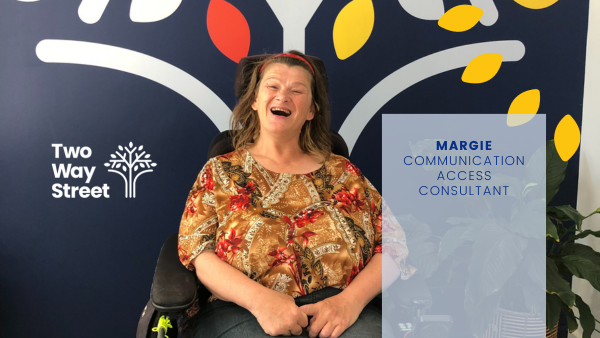AAC users8 August 2023

I was born with Cerebral Palsy and grew up using my natural speech with what I like to call a ‘Cerebral Palsy accent’ (some of you may call this a communication disability). It was an era when talking freely about emotions just didn’t occur. Limited options for speech generating devices made it difficult for me to communicate effectively, and when I did try to express my feelings, the outcomes were often disastrous for me and those around me.
My parents did their best to create a happy and nurturing home environment. Dinner time was a fabulous time of sharing laughter and conversations, but it would have been immensely valuable if my parents had access to a program like Talking About The Important Stuff to support my emotional development, just as they could with my brother. This would have provided strategies not only to talk about emotions, but to provide children with complex communication needs (CCN) with avenues to express thoughts and feelings, just like any other child. We now recognise the significance of supporting parents and caregivers in this journey as well.
As a child with communication difficulties, my Dad tended to over-protect me, wrapping me in cotton wool as the saying goes! However, I have come to appreciate the wisdom in quotes from people with lived experience of CCN in Talking About The Important Stuff. Quotes like “throw them out of their wheelchair (gently) and let them eat dirt” and “the kid with disability should not be the centre of love all the time”. These quotes serve as powerful reminders that children with CCN deserve to experience everyday life and be exposed to the realities of the world, just like any other child. Over-protection hinders our growth and independence, whereas providing us with opportunities to learn, explore, and be understood promotes our emotional development and self-empowerment.
While it is crucial to start conversations about “the important stuff” during childhood, I am a strong advocate for providing tools and strategies that continue to support individuals with CCN throughout adulthood. Conversations around independence, personal safety, and self-empowerment are long overdue for anyone with a disability, and they hold even greater significance for people with CCN.
Speech Pathologists can work with children and adults with CCN to support them to build on their natural speech. They can also support by introducing Augmentative and Alternative Communication (AAC) as a way to supplement this speech or to give them another way of communicating. AAC systems can take many forms e.g., sign, aided language displays (ALDs), comprehensive communication books (PODD), speech generating devices and many more.
Thinking back to when I was young and having speech therapy, I remember having to listen to the words on a flash card, repeat the words and then sound out each word as I said them. I’m pleased to say, especially during Speech Pathology Week 2023, that nowadays speech therapy looks different. Speechies are much more involved in advocating what works best for their clients and ensuring that all ways that a person communicates are valued. This is important, especially when considering the future “voice” for their individual client. #SPWeek
Through my journey with communication disabilities, I have come to realise the immense power of words in shaping our understanding of one another. By embracing the voices of children with CCN and providing them with the means to express themselves, alongside continued support throughout adulthood, we create opportunities for meaningful connections and a life that flourishes with possibilities.
